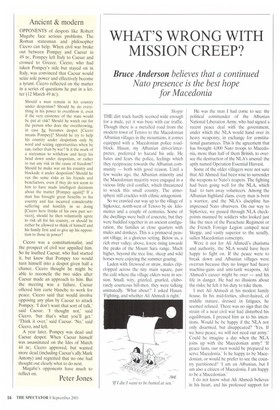Ancient & modern
OPPONENTS of despots like Robert Mugabe face serious problems. The Roman statesman and philosopher Cicero can help. When civil war broke out between Pompey and Caesar in 49 BC, Pompey left Italy to Caesar and crossed to Greece. Cicero, who had taken Pompey's side but stayed on in Italy, was convinced that Caesar would seize sole power and effectively become a tyrant. Cicero reflected on the matter in a series of questions he put in a letter (12 March 49 BC):
Should a man remain in his country under despotism? Should he do everything in his power to overthrow it, even if the very existence of the state would be put at risk? Should he watch out for the person who does the overthrowing, in case he becomes despot [Cicero means Pompey]? Should he try to help his country under despotism only by word and seizing opportunities when he can, rather than by war? Is it the mark of a statesman to withdraw and keep his head down under despotism, or rather to run any risk in the cause of freedom? Should he make war on his country and blockade it under despotism? Should he run the same risks as his friends and benefactors, even if they do not seem to him to have made intelligent decisions about the matter [Pompey again]? If a man has brought great benefits to his country and has incurred considerable suffering and hostility in so doing [Cicero here thinks of his own past services], should he then voluntarily agree to risk all for his country, or should he rather be allowed to think of himself and his family first and to give up his opposition to those in power?
Cicero was a constitutionalist, and the prospect of civil war appalled him. So he loathed Caesar, who had started it, but knew that Pompey too would turn himself into a despot given half a chance. Cicero thought he might be able to reconcile the two sides after Caesar made an approach to him. But the meeting was a failure. Caesar offered him carte blanche to work for peace. Cicero said that would involve opposing any plan by Caesar to attack Pompey. 'I don't want that sort of talk,' said Caesar. 'I thought not,' said Cicero, 'but that's what you'll get.' 'Think it over,' said Caesar. `No,' said Cicero, and left.
A year later, Pompey was dead and Caesar despot. When Caesar himself was assassinated on the Ides of March 44 BC, Cicero approved, but wanted more dead (including Caesar's ally Mark Antony) and regretted that no one had thought out clearly what to do next.
Mugabe's opponents have much to


































































 Previous page
Previous page